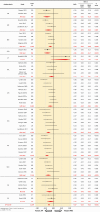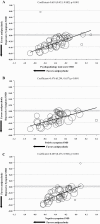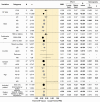Antidepressive Effect of Antipsychotics in the Treatment of Schizophrenia: Meta-Regression Analysis of Randomized Placebo-Controlled Trials
- PMID: 33151310
- PMCID: PMC7968624
- DOI: 10.1093/ijnp/pyaa082
Antidepressive Effect of Antipsychotics in the Treatment of Schizophrenia: Meta-Regression Analysis of Randomized Placebo-Controlled Trials
Abstract
Background: Antipsychotics improve the positive symptoms of schizophrenia. However, little is known about the extent of antidepressive effects of antipsychotics and their correlation with effects on other symptom domains in schizophrenia. The aim was to investigate whether antidepressive effects of antipsychotics have a significant correlation with the effects on specific symptom domains of schizophrenia.
Methods: Electronic databases were searched to identify eligible studies that reported antidepressive effects of antipsychotics for the treatment of adult patients with schizophrenia in double-blind, randomized placebo-controlled trials (RCTs). Mean change from baseline in depressive symptoms was meta-analyzed, and the correlation with the effects on other symptom domains was examined through meta-regression analysis.
Results: Thirty-five RCTs (13 890 patients) were included in this meta-analysis. Overall, antipsychotics showed greater efficacy than placebo in reducing depressive symptoms, with small to medium effect sizes (standardized mean difference = -0.27, 95% confidence interval -0.32 to -0.22, P < .001). All the antipsychotics, except for chlorpromazine, haloperidol, and ziprasidone, were associated with significantly greater decreases in depressive symptoms compared with placebo (standardized mean difference = -0.19 to -0.40). A higher antidepressive effect was significantly correlated with a higher improvement in Positive and Negative Syndrome Scale/Brief Psychiatric Rating Scale total, positive, and negative, and Positive and Negative Syndrome Scale-general psychopathology symptoms (β = .618, P < .001; β = .476, P < .001; β = .689, P < .001; β = .603, P < .001, respectively).
Conclusions: Second-generation antipsychotics (except for ziprasidone) were associated with small to medium effects sizes on improvement in depressive symptoms among adult patients with schizophrenia. The antidepressive effect of antipsychotics was significantly correlated with improvement in other symptom domains, with the highest correlation observed for improvement in negative symptoms.
Prospero registration number: CRD42019133015.
Keywords: Antipsychotics; antidepressants; meta-regression; psychopathology; schizophrenia.
© The Author(s) 2020. Published by Oxford University Press on behalf of CINP.
Figures



Comment in
-
Schizophrenia, Depressive Symptoms, and Antipsychotic Drug Treatment.Int J Neuropsychopharmacol. 2021 Apr 21;24(4):253-255. doi: 10.1093/ijnp/pyaa091. Int J Neuropsychopharmacol. 2021. PMID: 33882123 Free PMC article. No abstract available.
Similar articles
-
Efficacy and safety of antidepressant augmentation of continued antipsychotic treatment in patients with schizophrenia.Acta Psychiatr Scand. 2018 Mar;137(3):187-205. doi: 10.1111/acps.12854. Acta Psychiatr Scand. 2018. PMID: 29431197
-
Maximizing response to first-line antipsychotics in schizophrenia: a review focused on finding from meta-analysis.Psychopharmacology (Berl). 2019 Feb;236(2):545-559. doi: 10.1007/s00213-018-5133-z. Epub 2018 Nov 30. Psychopharmacology (Berl). 2019. PMID: 30506237 Review.
-
Folic acid/methylfolate for the treatment of psychopathology in schizophrenia: a systematic review and meta-analysis.Psychopharmacology (Berl). 2018 Aug;235(8):2303-2314. doi: 10.1007/s00213-018-4926-4. Epub 2018 May 22. Psychopharmacology (Berl). 2018. PMID: 29785555
-
Adjunctive second-generation antipsychotics for specific symptom domains of schizophrenia resistant to clozapine: A meta-analysis.J Psychiatr Res. 2019 Jan;108:24-33. doi: 10.1016/j.jpsychires.2018.11.005. Epub 2018 Nov 3. J Psychiatr Res. 2019. PMID: 30447508
-
Antipsychotic and antidepressive effects of second generation antipsychotics: two different pharmacological mechanisms?Eur Arch Psychiatry Clin Neurosci. 2005 Jun;255(3):190-201. doi: 10.1007/s00406-005-0587-5. Eur Arch Psychiatry Clin Neurosci. 2005. PMID: 15995903 Review.
Cited by
-
Treatment of Depression with Vortioxetine and Second Generation Antipsychotics During the Period of Remission Formation in Schizophrenia (Interim Data Analysis).Consort Psychiatr. 2023 Mar 31;4(1):18-36. doi: 10.17816/CP3728. Consort Psychiatr. 2023. PMID: 38239568 Free PMC article.
-
Bio-behavioural changes in treatment-resistant socially isolated FSL rats show variable or improved response to combined fluoxetine-olanzapine versus olanzapine treatment.IBRO Neurosci Rep. 2022 Sep 5;13:284-298. doi: 10.1016/j.ibneur.2022.08.009. eCollection 2022 Dec. IBRO Neurosci Rep. 2022. PMID: 36204253 Free PMC article.
-
Dysregulated Pathways During Pregnancy Predict Drug Candidates in Neurodevelopmental Disorders.Neurosci Bull. 2025 Jun;41(6):987-1002. doi: 10.1007/s12264-025-01360-0. Epub 2025 Feb 6. Neurosci Bull. 2025. PMID: 39913063
-
Clinical Effectiveness of Lurasidone Monotherapy in Patients with Acute Episodes of Schizophrenia and Associated Symptoms of Depression.Consort Psychiatr. 2022 Sep 30;3(3):56-70. doi: 10.17816/CP172. eCollection 2022. Consort Psychiatr. 2022. PMID: 39044917 Free PMC article.
-
Mortality in people with schizophrenia: a systematic review and meta-analysis of relative risk and aggravating or attenuating factors.World Psychiatry. 2022 Jun;21(2):248-271. doi: 10.1002/wps.20994. World Psychiatry. 2022. PMID: 35524619 Free PMC article.
References
-
- Addington D, Addington J, Maticka-Tyndale E (1993) Assessing depression in schizophrenia: the Calgary Depression Scale. Br J Psychiatry S22:39–44. - PubMed
-
- Addington D, Addington J, Patten S (1998) Depression in people with first episode schizophrenia. Br J Psychiatry, Supplement 172:90–92. - PubMed
-
- Andreasen NC, Olsen S (1982) Negative v positive schizophrenia. Definition and validation. Arch Gen Psychiatry 39:789–794. - PubMed
-
- Bermanzohn PC, Siris SG (1992) Akinesia: a syndrome common to parkinsonism, retarded depression, and negative symptoms of schizophrenia. Compr Psychiatry 33:221–232. - PubMed
-
- Bottlender R, Strauss A, Möller HJ (2000) Prevalence and background factors of depression in first admitted schizophrenic patients. Acta Psychiatr Scand 101:153–160. - PubMed
Publication types
MeSH terms
Substances
LinkOut - more resources
Full Text Sources
Medical

